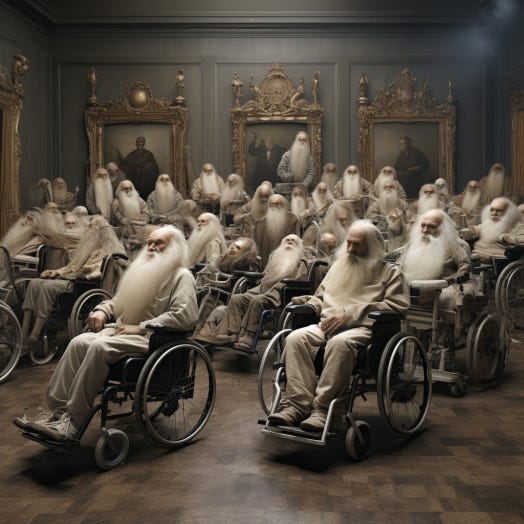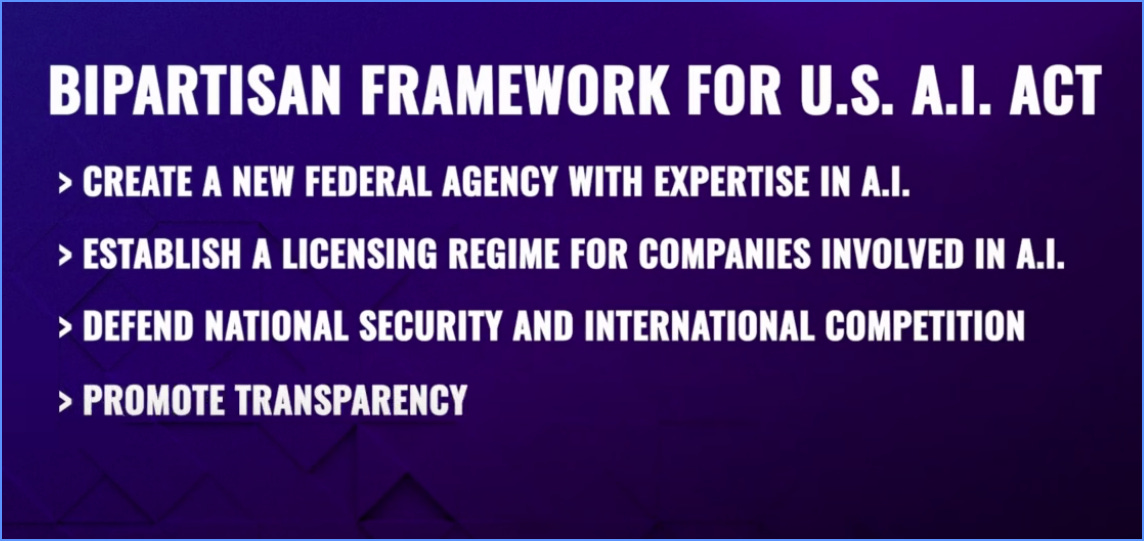Does Congress even have a clue about how to regulate AI?
If the history of US tech legislation is any indication, then no, they don't.
The council of nearly dead elders. Source: Midjourney.
Leaders of the biggest AI companies in the United States made a visit to a senior center in Washington, DC, yesterday. Their audience unplugged their rotary phones, turned off their fax machines, silenced their pagers, and listened in rapt attention as the CEOs discussed the need for regulation over their nascent industry.
"They were all seemed like very nice young men," said Senator Dianne Feinstein, between hits of oxygen. "Who were they again?" [1]
Then the senior senator from California got into a squabble with Chuck Grassley and Mitch McConnell over whether to have banana or butterscotch pudding for lunch. [2]
The median age of a US senator is 65.3 years. That means half of that august body of legislators are older than dirt. They're probably still paying for AOL dialup, printing out emails, and trying to remember their Geocities passwords.
Yet these are the people with the task of regulating an industry that a) is moving at light speed, and b) has the potential to radically alter (and possibly destroy) society as we know it.
Good times.
It's not that old dogs are incapable of learning new tech tricks. It's that these old dogs are busy napping in that little square of sunshine next to the kitchen door, and will growl if you try to wake them up.
Aside from a handful of Senators who've made technology part of their brand (Oregon's Ron Wyden and Ed Markey from Massachusetts come to mind), these people really don't get it. When it comes to regulating emerging technology, the US Congress has a terrible track record. [3]
Part of that has to do with them being captive to high-tech lobbyists who generously help them craft industry-friendly regulations. But most of it is because they're just like your grandmother/great uncle who keeps asking you to help them find the any key.
ICYMI: Bots behaving badly
So yesterday's hearing is actually a positive step. Hopefully at least some of them didn't sleep through it.
CEOs: Please save us from ourselves
The good news is that there was general agreement that some form of regulation is necessary. Even the tech CEOs were asking Congress to establish guardrails around labeling AI-generated content, limiting its impact on national security, and creating a new Department of AI to oversee the companies building these tools. [4]
Source: Scripps News.
Well they better get on it. The 2024 presidential race is already underway. Just two days ago, the FBI, National Security Agency, and Infrastructure Security Agency released an 18-page report warning about the use of deep fakes in the coming elections.
ICYMI: Can you still believe your eyes & ears? Probably not.
Of course, even if the Senate does manage to craft responsible legislation that's more than just a bunch of lofty platitudes with no enforcement mechanisms, it would then go on to the stationary clown car that is the GOP-controlled House of Representatives, where Marjorie Taylor Green will accuse ChatGPT of being woke because it uses the wrong pronouns.
Perhaps the only major stakeholder that wasn't invited to that closed door hearing was ChatGPT itself. The AI engine was so unhappy about being left at home with a babysitter that it held its breath and stomped its virtual feet for 90 minutes while the hearing was underway. The entire service went down, and OpenAI has not yet said why.
Better than nothing? Maybe.
Don't get me wrong. I'm not opposed to AI regulation. But I am opposed to shambolic AI legislation. And I'm pretty sure that certain members of Congress (and presidential hopefuls) would very much like to have AI deepfakes in their campaign arsenals as November 2024 draws closer.
So color me skeptical. In any case, AI is a global phenomenon, and half of the leading AI companies are based in China. Any real attempts to mitigate the dangers that AI presents need to be global, in much the same way nuclear weapons are regulated.
Yes, AI is da bomb. Let’s hope not literally.
If it was your job to regulate AI, what's the first thing you would you do? Share your thoughts in the comments below.
[1] Yes, I'm cranky and old, but I'm not that cranky and old.
[2] Moscow Mitch is the youngest of that trio at 81.
[3] My favorite example is the Digital Millennium Copyright Act of 1998, designed to protect owners of intellectual property from having their music, images, video, software, etc from being shared willy nilly across the Internet. The DMCA was then used to sue companies making universal garage door openers (they lost that one), by TV doctor and COVID-denier Drew Pinsky to silence his critics (lost that one too), by Disney to prevent people from sharing Baby Yoda GIFs, and by FIFA to punish parents who posted videos of their 7 year old dancing in front of a televised soccer match.
[4] It does not appear that the issues of plagiarism, copyright infringement, hallucinations, or the displacement of potentially millions of human workers are something our elected elders have any interest in addressing. Let’s hope I’m wrong.






Another excellent newsletter, Dan! Thanks for delivering the news - including the funnies.